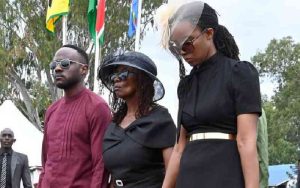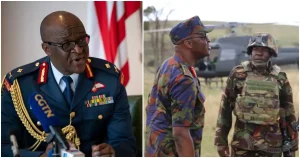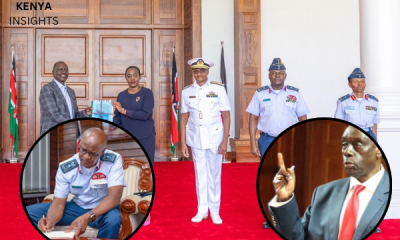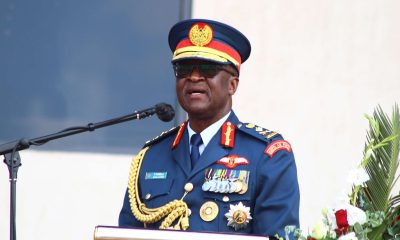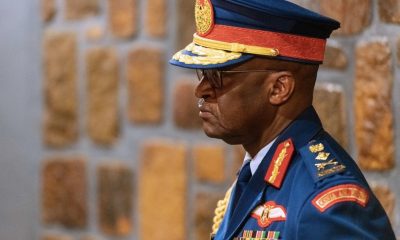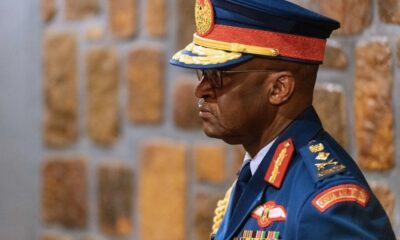News
Inside General Ogolla’s Will: Parents and Relatives Left Out Of His Sh150M Estate

As Kenya marked the first anniversary of General Francis Ogolla’s tragic death, a discreet filing at Nairobi’s High Court has reignited public fascination with the late Chief of Defence Forces.
His will, filed on June 3, 2024, by Miller & Company Advocates has sparked intense debate for excluding his parents and relatives, leaving his substantial estate to his immediate family.
The document, penned in 2012, offers a rare glimpse into the private convictions of a man whose legacy transcended the battlefield.
General Ogolla, who perished in a helicopter crash on April 18, 2024, in Elgeyo Marakwet County, crafted his will with the same precision that defined his military career.
Written in the presence of then-colleagues Lieutenant Colonel John Njenga and Lieutenant Colonel Stephen Sane, the 2012 document outlined a clear distribution of his estimated KSh 150 million estate, comprising property investments, nine bank accounts, three vehicles, and shares in Felora Investment Firm and a Sacco.
The will, deposited before Justice Patricia Nyaundi, centered exclusively on his wife, Aileen Ogolla, and their two children, Lorna Achieng and Joel Rabuku, leaving his parents, Mzee Joel Okech Oyieyo and his wife, and other relatives with nothing.
A Meticulous Blueprint for His Family
The will stipulated that Aileen would receive 50% of the estate, including all service benefits such as emoluments, pensions, gratuities, and compensation, as well as an apartment on Nairobi’s Hatheru Road.
The remaining 50% was to be equally shared between Lorna and Joel.
In the event of Aileen’s absence, the apartment’s ownership would pass equally to the children.
Lorna was designated to inherit a property near Pangani Shopping Centre, all shares at NIC Securities, and a Bible once owned by her paternal grandmother—a poignant nod to family heritage.
Joel, meanwhile, was allocated a property in Siaya, another near Pangani, Nairobi, and all of his father’s personal belongings and artefacts.
Any assets not explicitly mentioned were to be split equally between the siblings.
In a striking directive, Ogolla ordered that all his personal clothing be burned, stating, “I direct that ALL my personal clothing be disposed of by burning”.
The will also reflected his wishes for a modest funeral, specifying burial within 72 hours without a coffin, a request honored when he was laid to rest on April 21, 2024, in Siaya County.
Exclusion of Parents and Relatives Sparks Controversy
The exclusion of Ogolla’s parents, particularly his nearly 101-year-old father, has stirred controversy, given Kenya’s cultural expectation of providing for elderly kin.
The will’s blunt dismissal of other relatives—“To all my relatives – good luck”—has further fueled public discourse.
Sources suggest Ogolla may have supported his parents during his lifetime, pointing to their well-maintained homestead in Siaya as evidence.
However, the revelations of the will have left many to question whether the omission was intentional or reflective of prior provisions.
“It’s surprising for a man of his stature to leave his parents out,” said Mary Atieno, a Siaya resident.
“But if he took care of them before, maybe he felt his duty was done.” Others view the decision as a private matter, with Nairobi-based advocate Jane Wambui noting that Kenya’s Law of Succession Act grants individuals discretion in estate allocation.
“If lifetime support was provided, excluding parents from a will is legally sound,” she said. Still, the cultural weight of filial piety has amplified scrutiny, with social media debates oscillating between defending Ogolla’s choices and criticizing them as a breach of tradition.
A Legacy Beyond the Uniform
Ogolla’s estate, detailed in the will, underscores his financial acumen. His wealth included six properties—four in Siaya and two in Central Alego and East Alego—two residential houses, and significant investments. This portfolio, built over decades of service that earned him accolades like the Moran of the Golden Heart, reflects a disciplined approach to generational planning. The will’s focus on his nuclear family aligns with his private persona, described by those close to him as principled and deeply devoted.
Yet, the document also reveals a man unafraid of unconventional choices. The directive to burn his clothing and forgo a coffin speaks to a humility that contrasted with his public stature. “This was a man who valued simplicity in death, just as he valued clarity in life,” said a former colleague who requested anonymity. The will, filed through the reputable Miller & Company Advocates, stands as a testament to Ogolla’s meticulous nature, crafted long before his untimely death at age 62.
A Nation Reflects
As Kenya reflects on Ogolla’s towering legacy—from commanding the Kenya Defence Forces to shaping national security—the will has added a complex layer to his story.
It portrays a leader whose duty extended beyond the nation to the quiet dignity of family planning, even if his choices have sparked debate.
Whether the exclusion of his parents and relatives was a pragmatic decision rooted in prior support or a point of contention, it has cemented Ogolla’s narrative as one of love, duty, and legacy.
The controversy surrounding the will underscores the challenges public figures face in balancing personal decisions with societal expectations.
For now, General Ogolla’s final wishes remain a topic of national conversation, a reminder that true leadership is often measured not just in public acts but in the private blueprints left behind.
Kenya Insights allows guest blogging, if you want to be published on Kenya’s most authoritative and accurate blog, have an expose, news TIPS, story angles, human interest stories, drop us an email on [email protected] or via Telegram
-

 Grapevine2 weeks ago
Grapevine2 weeks agoA UN Director Based in Nairobi Was Deep in an Intimate Friendship With Epstein — He Even Sent Her a Sex Toy
-
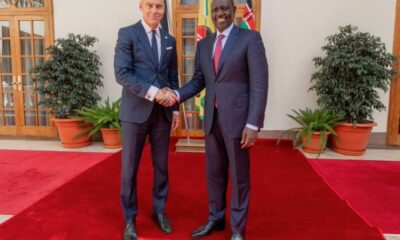
 Development3 days ago
Development3 days agoKenya Strips Dutch Climate Body of Diplomatic Immunity Amid Donor Fraud Scandal and Allegations of Executive Capture
-

 Investigations1 week ago
Investigations1 week agoHow Mexico Drug Lord’s Girlfriend Gave Him Away
-

 Business2 weeks ago
Business2 weeks agoSafaricom Faces Avalanche of Lawsuits Over Data Privacy as Acquitted Student Demands Sh200mn Compensation in 48 Hours
-

 Investigations1 week ago
Investigations1 week agoHow Close Ruto Allies Make Billions From Affordable Housing Deals
-

 Entertainment2 weeks ago
Entertainment2 weeks agoKRA Comes for Kenyan Prince After He Casually Counted Millions on Camera
-

 Business1 week ago
Business1 week agoAmerican Investor Claims He Was Scammed Sh225 Million in 88 Nairobi Real Estate Deal
-

 Business2 weeks ago
Business2 weeks agoSafaricom Under Storm As Acquitted Student Vows Massive Lawsuit After Teleco Admits Handing DCI His Private Data Without Court Order

